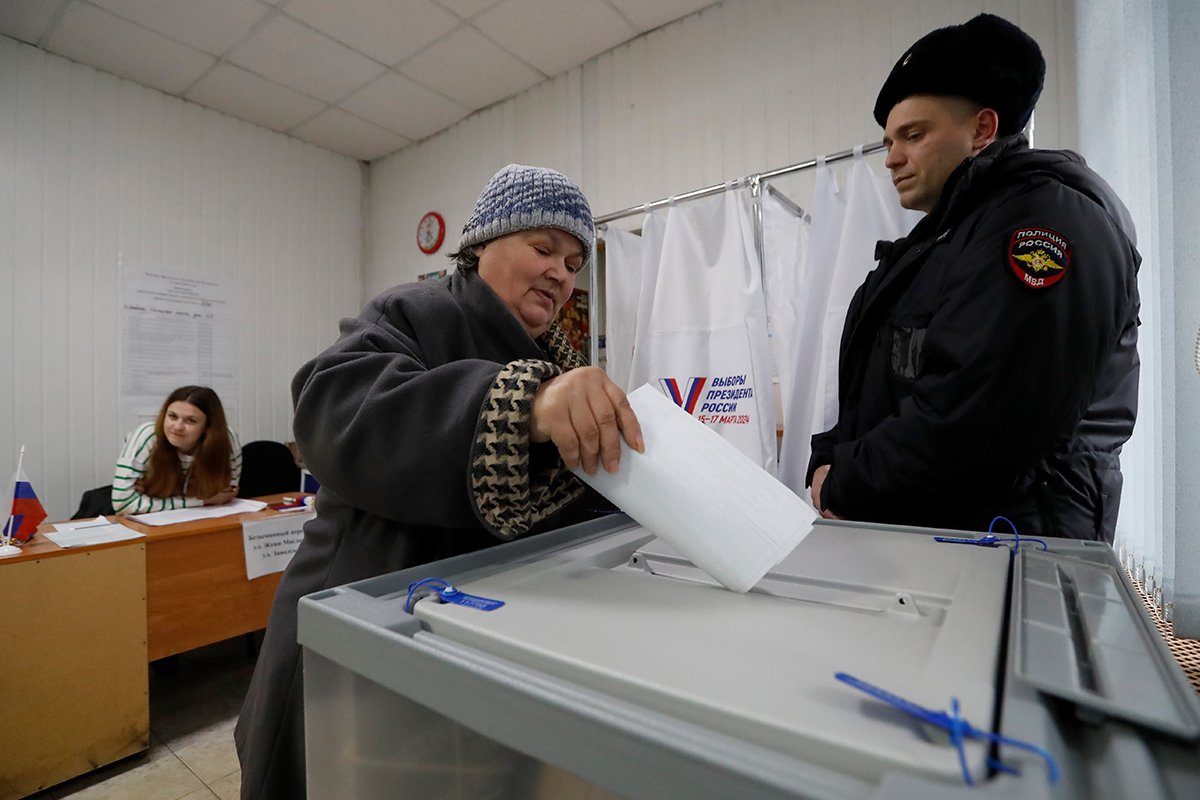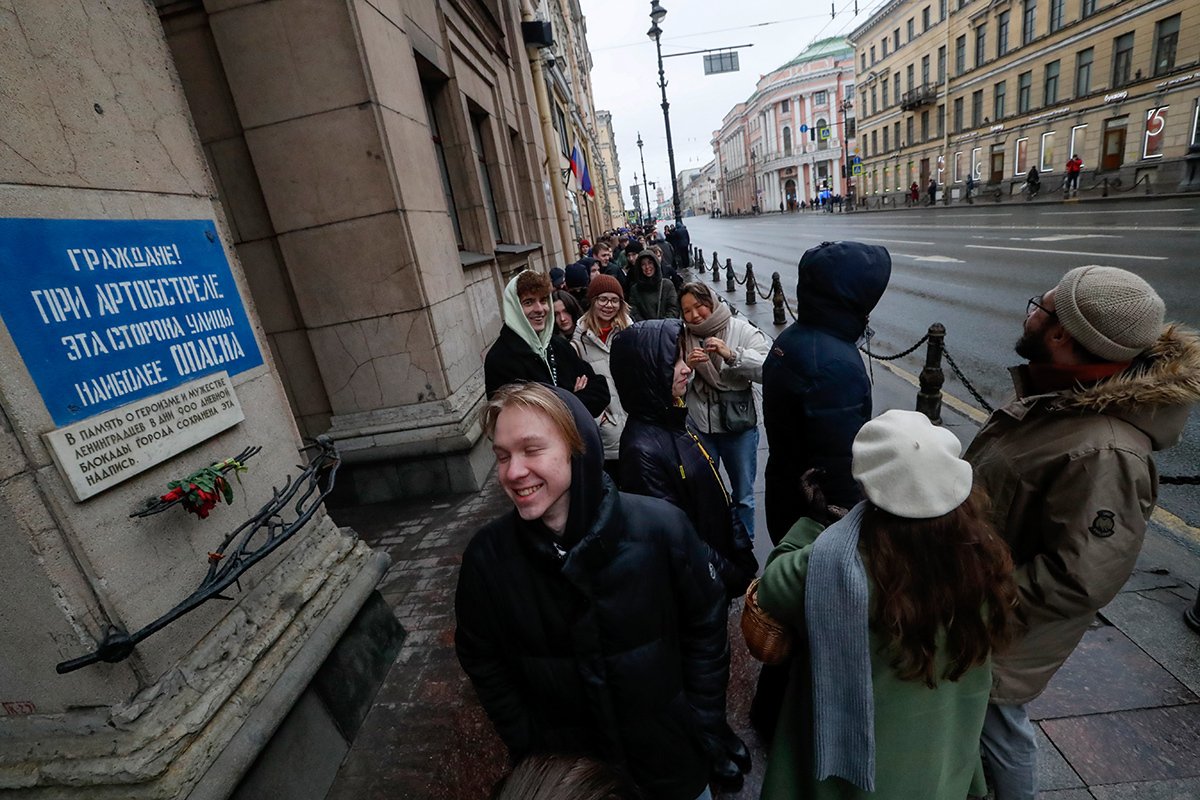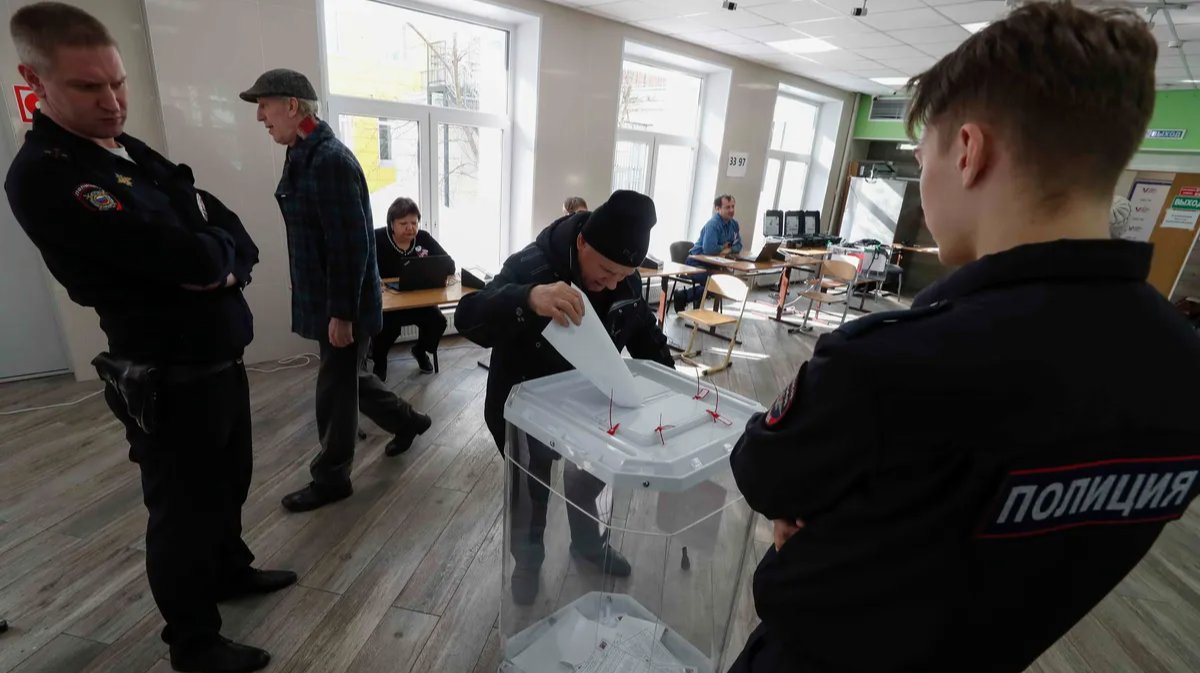Voter rights NGO Golos published its report on this weekend’s Russian presidential election on Monday, documenting the ballot’s lack of independent observers and a prevailing atmosphere of fear and coercion. The NGO also said that the ever greater powers granted to the police had led to an unprecedented surge in violent incidents. The report’s authors ultimately branded the Russian elections a sham.
Tampering with the law
Changes made to the law before the election reduced the rights of the electorate, limited public monitoring of polling stations and made it easier for the state to manipulate the process overall, the report charged.
Russian President Vladimir Putin had only been allowed to stand for another term in office due to the constitutional amendments passed in 2020, Golos noted. It added that so-called “foreign agents” are actively discriminated against by law, and their electoral rights have been rolled back, especially when it comes to the right to campaign or support candidates.
The report also found that restrictions on freedom of expression had become more severe, most notably since the invasion of Ukraine, when criticism of the war became impossible.
The process for potential candidates to collect the signatures required to run in the election had been made far more difficult and both online voting and the vote being held over three days have also made the process significantly less transparent, the report said. The analysts also pointed out flaws in the online voting system.

A woman casts her ballot in the Leningrad region while a police officer looks on, 16 March 2024. Photo: Anatoly Maltsev / EPA-EFE
Fear tactics and coercion
Election organisers relied on the authorities to get the electorate out to vote, Golos said, pointing to official turnout data, which showed that 70% of those who had registered to vote online had voted by the end of Friday. The total turnout by the end of the first day of voting stood at more than a third of eligible voters across the country as a whole, it added.
“Everything was done to keep voters under control. The authorities didn’t just get people from state or state-dependent companies out to vote. They did it at private companies too,” the NGO said.
The Golos hotline received 369 calls during the election and as of 17 March, the Fraud Map website had received 1,751 messages about potential cases of electoral fraud from more than 60 Russian regions, including 892 on the days of the vote themselves. Golos analysts said that they had never witnessed a presidential campaign that failed so flagrantly to live up to the standards outlined in the constitution, calling the whole electoral process a sham.
The legal framework was a sham, as was the notion of choice. The campaign was a sham, as was the so-called opposition. The idea of the election being free and fair was a sham. Election monitoring was a sham, and any idea that the election commissions were independent and the people were sovereign was, of course, also a sham, the report charged.
A surge in violence
Golos said it had recorded an unprecedented surge in violent incidents and threats during the election. On all three voting days, there were reports of ballots being spoiled with dye, ballot boxes being set on fire and even people dialling in fake bomb scares to polling stations. While there were no casualties, there were injuries in the city of Perm, in the Urals, when a 64-year-old local woman set off a firecracker at a polling station on Sunday.
“The system is good at covering up crimes by its own people, but it severely punishes ordinary voters carrying out acts due to a sense of desperation,” Golos said.

People are standing in line to vote in St. Petersburg at noon local time, most likely participating in the Noon against Putin campaign, 17 March 2024. Photo: Anatoly Maltsev / EPA-EFE
No independent observers
Golos said that the number of observers present for the elections had shrunk by more than half since the last presidential election. This was largely due to the candidates and parties themselves making no effort to ensure independent monitoring, and sabotaging citizen initiatives to organise replacements, Golos said.
Most complaints in this field related to the non-admission or removal of observers, acts of violence being perpetrated against them, and voters being forced to vote. There were also cases of people being banned from taking photographs, shooting video, moving freely around polling stations and voters being prevented from submitting complaints, despite all being fully within voters’ rights.
“There was no way for society to exercise any real independent control over these elections,” said the report.
Policing the vote
In addition to restrictions on the rights of observers and an increase in violence at polling stations, Golos also saw ever greater powers being handed to the police. At one Moscow polling station, a policeman demanded a ballot box be opened so that he could retrieve a spoiled ballot and detain the woman who spoiled it.
After ballot papers were spoiled with dye and ballot boxes set alight, staff at multiple polling stations in some regions removed the curtains from the voting booths and police officers looked over voters’ shoulders.
Golos noted that in some regions police asked voters who they intended to vote for, punished voters for writing on their ballots or for arriving at the polling station at the wrong time and, in some cases, even demanded to see how people had voted.
“Nothing like this has ever happened on this scale in a Russian election before,” the report said.
Golos was keen to point out that neither writing on the ballot paper nor choosing a convenient time to vote contravened any rules.
The heightened police presence at the election was closely bound up with the general air of tension within the country, Golo said, adding that it would be no exaggeration to describe the relationship between the government and society as developing along paramilitary lines, as already seen in Chechnya and the occupied territories of Ukraine.
“Wherever you live, Chechnya and Donetsk have now come to a place near you. They have come to your apartment to watch you vote,” Golos co-chairman Stanislav Andreychuk said.

